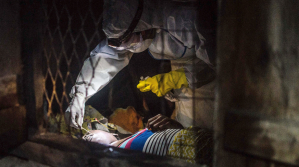
Daniel James, Red Cross Society volunteer
Kailahun, Sierra Leone
The first cadaver we buries was in a village called Gbanyawalu. When the body was turned over on his back for swabbing, it breathed - like someone who was suffocated. We almost ran out. Even the World Health Organization worker was not anticipating such a reaction from a corpse - especially one that was there three days before we arrived.
On July 10, I was called to the office of Constant Kargbo, under-secretary general of Disease Management Programmes and Operations for Sierra Leone's Red Cross Society.
"My man, I want to send you to Kailahun for dead body management. Will you go?" I took about five minutes to think on it, according to CNN.
I joined the Red Cross when I was young to work for humanity and to lessen the suffering of the most weak.
I said, "I am from Kailahun. I must go to save my people."
When I got to Kailahun, it was like a warzone. My family was scared and worrying. They called and asked me to turn back. My sister cried over the phone. I reassured her.
We bury six bodies a day, on average. Taking blood samples from the corpses is the hardest part of the job, according to CNN.
My teammates are professionals now. Our protective equipment and a chlorine solution are our protection. We have the ABC Rule: Avoid Body Contact.
"Gentlemen, you have done safe work and I am confident you are safe in this moment. When you go home, be mindful of your personal activities until we meet again tomorrow." That's my last word of caution to them whenever we come from the field, according to CNN.
And no one has ever complained of even a single headache.
Thank God.
Workers donning personal protective equipment stand inside the contaminated area at the ELWA Hospital in Monrovia, Liberia. The hospital is run by Doctors without Borders.
Shortly after getting to Monrovia, I recognized that my colleagues were astounded by the scope of the Ebola outbreak. Our treatment center - the biggest MSF has ever run - was full, and Stefan, our field coordinator, was turning people away at the gate. On an MSF mission, you have to be flexible. I put myself forward for the job, because someone has to do it.
Pierre Trbovic, hospital gatekeeper
A father with a sick daughter in his trunk was the first person I had to turn away. He begged me to take his daughter. He said even if they couldn't save her life, they could save her from killing the rest of the family, according to CNN.
Other families have abandoned sick family members at the hospital's door by pulling up and letting them out. This may seem cruel, but it's impossible to say what anyone else would do in this situation. Whether it's putting your sick daughter in the trunk of your car to try and get her help or dropping loved ones off at a hospital never to return to your home, we need to seek God's wisdom for a compassionate model of living.







